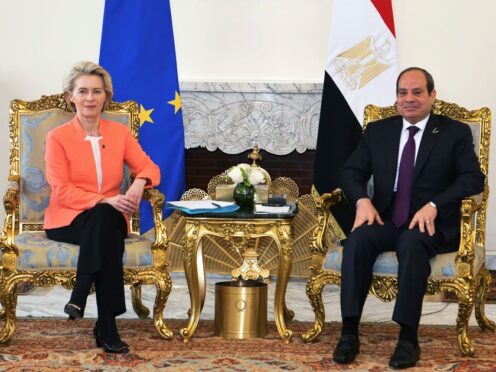The European Union on Sunday announced a 7.4 billion-euro (£6 billion) aid package for cash-strapped Egypt as concerns mount that economic pressure and conflicts in neighbouring countries could drive more migrants to European shores.
The deal, which drew criticism from rights groups over Egypt’s human rights record, was signed Sunday afternoon in Cairo in a ceremony attended by Egyptian President Abdel Fattah el-Sissi, European Commission President Ursula von der Leyen and leaders of Belgium, Italy, Austria, Cyprus and Greece.
Mr El-Sissi met separately with Ms von der Leyen and other European leaders before the signing ceremony on Sunday afternoon.
The aid package includes both grants and loans over the next three years for the Arab world’s most populous country, according to the EU’s mission in Cairo. Most of the funds — five billion euros (£4.24 billion)— are macro-financial assistance, according to a document from the EU mission in Egypt.

The mission said that the two sides have promoted their co-operation to the level of a “strategic and comprehensive partnership”, paving the way for expanding Egypt-EU co-operation in various economic and noneconomic areas.
Mr el-Sissi’s office said in a statement that the deal aims to achieve “a significant leap in co-operation and co-ordination between the two sides and to achieve common interests”.
“Your visit today represented a very important milestone in the relations between Egypt and the European Union,” Mr el-Sissi told the visiting European leaders. He said the deal has achieved a “paradigm shift in our partnership”.
A joint statement said after the summit: “The European Union recognises Egypt as a reliable partner and its unique and vital geostrategic role as a pillar of security, moderation and peace in the Mediterranean, Near East and African region.”
Italy’s Prime Minister Giorgia Meloni, whose country played a major role in achieving the deal, lauded it as “historic”.
“This initiative shows our willingness to strengthen and encourage a new structural method of co-operation between the two sides of the Mediterranean,” she told the summit in Cairo.
The deal, known as the Joint Declaration, aims among other things to promote “democracy, fundamental freedoms, human rights, and gender equality”, according to the European Commission.
Both sides will also deepen their co-operation to address challenges related to migration and terrorism.
The EU will provide assistance to Egypt’s government to fortify its borders, especially with Libya, a major transit point for migrants fleeing poverty and conflicts in Africa and the Middle East.

The 27-nation bloc will also support the government in hosting Sudanese who have fled nearly a year of fighting between rival generals in their country. Egypt received more than 460,000 Sudanese since April last year.
The deal comes amid growing concerns that Israel’s looming ground offensive on Gaza’s southernmost town of Rafah could force hundreds of thousands of people to break into Egypt’s Sinai Peninsula. The Israel-Hamas war, now in its sixth month, has pushed more than one million people to Rafah.
Egypt says there are nine million migrants, including about 480,000 who are registered refugees and asylum-seekers with the UN refugee agency.
Many of those migrants have established their own businesses, while others work in the huge informal economy as street vendors and house cleaners.
The deal would inject much-needed funds into the Egyptian economy which has been hit hard by years of government austerity, the coronavirus pandemic, the fallout from Russia’s full-scale invasion of Ukraine, and most recently, the Israel-Hamas war in Gaza.
Egypt reached a deal with the International Monetary Fund earlier this month to increase a bailout loan to £6 billion, up from £2.36 billion, after marathon negotiations. The deal with the IMF was combined with economic reforms that included the flotation of the Egyptian pound and a sharp raising of the main interest rate.
The EU deal follows the template of those recently signed with Tunisia and Mauritania that pledged funds in return for fortifying their borders. Both Tunisia and Mauritania were key points of departure for migrants crossing the Mediterranean and a stretch of the Atlantic to Italy and Spain, respectively, and they too were criticised for alleged abuses against migrants.
The package drew criticism from international rights groups over Egypt’s human rights record. Amnesty International urged European leaders not to be complicit with human rights violations taking place in Egypt.
“EU leaders must ensure that the Egyptian authorities adopt clear benchmarks for human rights,” said Eve Geddie, Amnesty International’s head of the European institutions office. Ms Geddie pointed to Egypt’s restrictions on media and freedom of expression and a crackdown on civil society.
